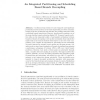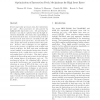225 search results - page 14 / 45 » A Predictive Performance Model for Superscalar Processors |
105
click to vote
APCSAC
2005
IEEE
15 years 5 months ago
2005
IEEE
Conditional branch induced control hazards cause significant performance loss in modern out-of-order superscalar processors. Dynamic branch prediction techniques help alleviate th...
HPCC
2007
Springer
15 years 6 months ago
2007
Springer
We propose a model for describing the parallel performance of multigrid software on distributed memory architectures. The goal of the model is to allow reliable predictions to be m...
111
Voted
ISCA
1995
IEEE
15 years 3 months ago
1995
IEEE
Recent superscalar processors issue four instructions per cycle. These processors are also powered by highly-parallel superscalar cores. The potential performance can only be expl...
CF
2006
ACM
15 years 3 months ago
2006
ACM
The slowing pace of commodity microprocessor performance improvements combined with ever-increasing chip power demands has become of utmost concern to computational scientists. As...
ISVLSI
2007
IEEE
15 years 6 months ago
2007
IEEE
As technology scales, more sophisticated fabrication processes cause variations in many different parameters in the device. These variations could severely affect the performance ...


